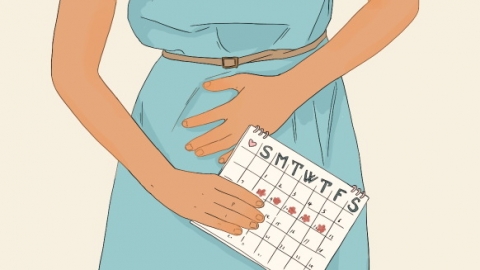What to do if menstruation is delayed after an abortion
Abortion usually refers to an induced abortion procedure. Generally, delayed menstruation after an induced abortion may be caused by slow endometrial repair, excessive postoperative mental stress, endocrine disorders, endometritis, or intrauterine adhesions. It is recommended to seek timely medical attention, identify the underlying cause, and then improve the condition through general treatment, medication, or surgical treatment under a doctor's guidance. Detailed explanations are as follows:

1. Slow endometrial repair: The endometrium is damaged during the abortion procedure and may take longer to heal, leading to delayed menstruation. Postoperatively, avoid fatigue, ensure sufficient rest, and consume more protein-rich foods and soy products to promote endometrial repair.
2. Excessive postoperative mental stress: Emotional disturbances such as anxiety and tension can interfere with the hypothalamic-pituitary-ovarian axis, affecting hormone secretion and causing delayed menstruation. Alleviate stress through listening to music, exercising, communicating with family members, maintaining a regular sleep schedule, and avoiding staying up late.
3. Endocrine disorders: Hormone levels may not recover promptly after an abortion, leading to abnormal ovulation and delayed menstruation. This may be accompanied by symptoms such as hot flashes and insomnia. Patients should follow their doctor's instructions to use medications such as ethinylestradiol cyproterone tablets, drospirenone ethinylestradiol tablets, or desogestrel ethinylestradiol tablets to regulate hormone levels and restore a normal ovulatory cycle.
4. Endometritis: Bacterial infection following an abortion can cause inflammation, affecting normal endometrial shedding and resulting in delayed menstruation, which may be accompanied by lower abdominal pain. Patients should follow their doctor's instructions to use medications such as cefuroxime axetil tablets, metronidazole tablets, or levofloxacin hydrochloride capsules to control the infection.
5. Intrauterine adhesions: Damage to the endometrium during an abortion can lead to partial or complete adhesion of the uterine cavity, obstructing menstrual blood flow and causing delayed menstruation or even amenorrhea. Mild adhesions can be treated with medications such as estradiol tablets, dydrogesterone tablets, or progesterone soft capsules as directed by a doctor to promote endometrial repair and relieve adhesions. Severe adhesions require hysteroscopic adhesion lysis surgery to separate the adhesions and restore the normal shape of the uterine cavity.
In daily life, it is important to keep warm postoperatively to avoid catching a chill, maintain cleanliness and dryness of the external genital area, and change underwear frequently. Avoid sexual activity and strenuous exercise for one month after surgery, attend regular follow-up appointments, and practice proper postoperative care to promote recovery and reduce the occurrence of menstrual abnormalities.




